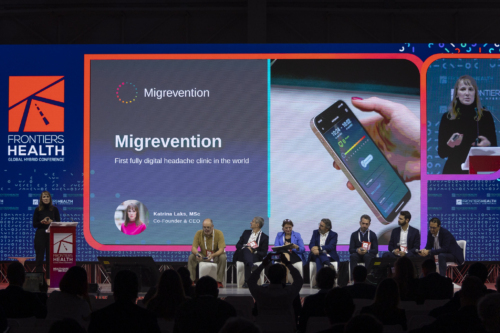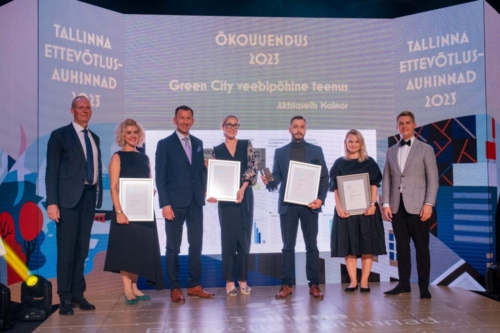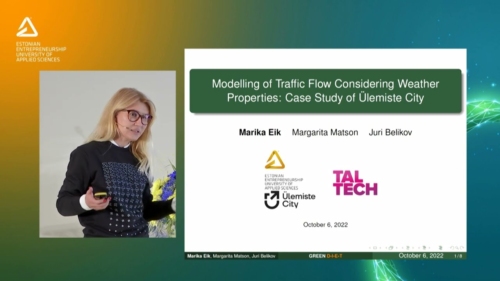Are Microdegree Programs the Future of Education?
Many new professions have emerged in the technology and start-up field that you cannot study in a university. How to master a profession? Are degree studies changing in this fast-developing world? Can you put together your education yourself in contrast to following the curriculum that we are used to? And how do you do it?
One option for that is microdegree programs becoming more popular in Europe that also reached the colleges in Estonia as of this year. With representatives of Tartu University, Estonian Entrepreneurship University of Applied Sciences and TalTech, we discussed how these are helping people in the constantly changing job market.
Create Your Own Master’s Curriculum
Ly Hõbe, the vice-rector for academic affairs at Estonian Entrepreneurship University of Applied Sciences, said that according to the leading experts of the European Union, in the next ten years, people need to upgrade their existing qualifications to be up to date with the changes in the job market. Hõbe said, “Things are developing fast, which is why people need to master new skills quickly.”
“That is why taking part in a microdegree program is a good opportunity for improving existing knowledge or learning something completely new in a shorter period,” said Tiia Ristolainen, the head of the Lifelong Learning Centre of Tartu University.
Although you have to pay for microdegree programs in all universities, there are many people interested in them. High school graduates and people who have obtained a higher education years ago can join the programs. Several programs are also available on the Training Credit page of Ülemiste City.
“The aim is to bring people with special education back to school,” Hõbe said. “For example, a person who obtained a master’s degree 20 years ago and feels that he wants to learn more about the newest management competencies.” The benefit here is that people with different experiences come together and then start exchanging their experiences and thoughts.
“Going through the program is a good opportunity for those who consider it important to learn new subjects but don’t want to cover the whole curriculum or want to be sure about their decision before starting their degree studies or want to change their field,” said Ristolainen. Microdegree programs differ from regular education in that their volume is substantially more limited.
The programs are developed in a way that people who go through them have the chance to continue a degree study curriculum afterwards and obtain a degree. The representatives of TalTech, Estonian Entrepreneurship University of Applied Sciences and Tartu University said that although the microdegree programs are still in a developmental phase, in the future, by combining different programs with regular studies, one can get a bachelor’s or a master’s degree.
The Programs are Crowded
As of its autumn semester, Tartu University is organising microdegree programs of 12-24 ECTS lasting 1-2 semesters. According to Ristolainen, the programs are very popular in the university. Ristolainen said, “We announced the opening for 20 programs and more than 250 students registered.”
Some programs, such as “Music Producer”, were so popular that all applicants could not be accepted. “Computer-aided translation programs, machine translation and web-based tools using European Union texts as examples”, “Creative entrepreneur”, “Microdegree in innovation”, “Data analysis”, ”System analysis” and ”The main knowhow of career counselling” were also very popular.
There were also a lot of microdegree applicants at TalTech – out of 130 applications, only 86 were accepted. At TalTech, you can get a microdegree in 1 to 3 semesters, receiving a maximum of 45 ECTS, but students mostly get 12-18 ECTS.
Hanno Tomberg, the head of TalTech Open University, said that the most popular was “Programming” into which 30 applicants were accepted. “There’s a huge interest in the IT field in society. Some have learned to program in high school or on their own, but here they also get the academic knowledge,” Tomberg explained. “Business processes” and “Marketing” were also popular with 17 and 8 students, accordingly.
Financing Opportunities
Though the microdegree programs mentioned above are not for free, there are many ways in Estonia to finance the studies. Ristolainen said that, despite most of the applicants at Tartu University being working adult learners, there were also people whose studies were funded by the Estonian Unemployment Insurance Fund.
Ülemiste City finances the self-development of its community by offering its members Training Credit – all of the companies on campus can get training credit for free. The Training Credit platform lists the courses of the biggest universities in Estonia on one webpage so that you would not have to search open training courses individually on the webpage of each university. The training credit encourages employees to participate in (follow-up) training courses and enforce cooperation between companies and colleges. This way, the community of Ülemiste City can develop itself for free using microdegrees.
The Programs Are Still in Progress
At Estonian Entrepreneurship University of Applied Sciences, the development of microdegree programs is still in progress – the first students will start their studies in the spring semester of 2022. At Estonian Entrepreneurship University of Applied Sciences, you can take microdegree subjects in the volume of 5-15 ECTS. The goal is to offer students specific, profound knowledge. According to Hõbe, “The program has to go into detail and cover the speciality more deeply than during regular studies.”
“In the future, microdegrees could be the form of obtaining new knowledge,” said Tomberg. He added that the focus should be on how to make the delivery of the programs even better. “Unfortunately, the capacity of the universities to offer these programs is limited; this is why we have to focus more on areas more popular and with more applications,” Tomberg said.
Tartu University is also planning on continuing to develop the programs. “Next year, there will be more programs, but we’re still working on them,” said Ristolainen. Tartu University is also planning on continuing with the existing programs. As microdegrees aim to give people the chance to improve their knowledge and skills and be more competitive in the job market, universities are also cooperating with potential employers. “We intend to communicate with employers to find out which other microdegree programs need to be developed,” said Ristolainen.





























